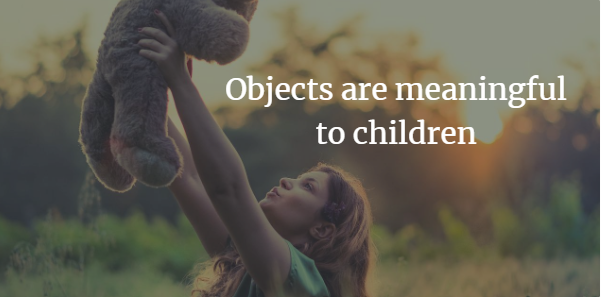
I wouldn’t have written this except I saw it live. My son, 10, went to a soccer game. He had to go to his sister’s game first and then walk over to his. After the game, he realized he didn’t have his water bottle. He had also lost his game, ruining their undefeated streak, which didn’t help. But he was absolutely distraught that he lost his water bottle. He thought he left it at his sister’s game. We went to check, and it wasn’t there. We eventually found it in the van, which restored his sense of contentment. But the pain of possibly losing his water bottle, one specially made for him for soccer, was really rather unbearable.
Letting a child lose a valuable item in the name of “natural consequences” is something some psychologists and even some parents proudly say they do. In fact, in the series, “Your Two-Year Old,” “Your Three-Year-Old,” etc. by Dr. Louise Bates Ames, she proudly says if a child’s tricycle gets stolen because the child left it out, then it gets stolen. This is a “natural consequence.” I’ve seen adults say if their child goes to school without their lunch, then they don’t eat lunch. As this isn’t directly punitive, it is, in their eyes, “positive” and a “learning experience.”
I don’t find anything about this healthy nor a growth measure, and, in fact, I find it potentially mentally damaging. Adults aren’t this mean to other adults. If an adult loses something valuable to them, they try to retrieve it. They might even get law enforcement involved. If I forget something, other adults will sometimes help me out. If I’m late, other adults are forgiving. I in fact forgot my ID once, before going to a bar (when I was much younger). A man with me said, “Well, too bad!” I felt the intense emotional abuse that this is. Driving back would have been 10 minutes, tops. This is intense psychological abuse. (And that man was very emotionally abusive.)
There is a psychological abuse tactic is called “gaslighting.” This was named after a movie with a similar title. The man in the movie kept lighting and blowing out candles and denying he was doing it, to make his abuse victim go crazy. Knowing that things are what they are and that what you need is nearby–constant–without changing, going out, or getting lost, is essential to human mental health. Have you ever lost your keys? The feeling is maddening. They should be there and yet they aren’t. If someone PURPOSELY stole your keys, this is even more maddening. If you lost your keys and someone doesn’t help you find them, this is also something that can send people into despair. Now enter people who won’t help children find what they lost.
The stereotype of “mom” is that she can find anything. I’ve seen the meme before, “If mom can’t find it, we’re really screwed.” This is what moms, rather famously, do. They find things. I remember once when my daughter lost an earring at a public park. It seemed impossible to find it and I was told to keep walking. Instead, I felt, deeply, that we should at least to go try to find it. I looked at the most likely place it would be, which is a bench we were sitting at, and found it. It was intensely meaningful for my daughter that I did that. And the meaningful part wasn’t the earring itself.
I do child development work. One of the things I have found in my work is that children are born into a state of fantasy and flux, not a world where reality is real. They are born with big imaginations, which drive them to ask curious questions, and investigate the world around them, eventually sorting out what is what (a process, I argue, that is never really done). Most importantly in this quest of theirs, they learn what is real, stable, and constant versus what is symbolic, imaginative, and apt to change. This overall process is what I call a “hill.” I call it a “hill” because children go “up” into fantasy and then come back down to reality. Children perceive the world as a sort of fuzzy haze at first. Any bit of knowledge they that have has to burst into clarity for them. And what bursts it into clarity? Their personal experimentation counts for something, but by and large, it is other humans. If children see that you see what they also see, it is powerful for them. In fact children are known to come up to you, “Daddy. Daddy! DADDY! Look!” They need your eyes directly on what it is they are learning. This still applies to me as an adult. Just today, I read someone say that olive oil caused them ill health. This was profoundly validating to me, because I found the same thing, and, in the avalanche of nutritionists telling us this is a “heart healthy fat,” it was easy to doubt myself. We need other humans to validate our experiences, in order for them to be “really true” to us.
Now what happens when an adult refuses to find a child’s beloved item? Because what I have found is it is profoundly necessary for adults to validate this sense of object constancy for children through mentorship, guidance, interest in them, and providing a safe, stable environment. I don’t see any learning experience in this “natural consequence.” It just sends a cold message to a child, and one, I put forward, that can potentially also deteriorate their mental health and emotional well-being.
I discuss these hills of child development and in particular their role in object constancy in my book Misbehavior is Growth: Four Year Olds. My child development work can be found at www.theobservantmom.com. Be sure to check out the new Observant Mom APP as well!
Thanks for reading. Please send your friends and family to The Observant Mom.

Amber is a child development researcher and a tireless advocate for the emotional health and well-being of children. Send your friends to The Observant Mom.